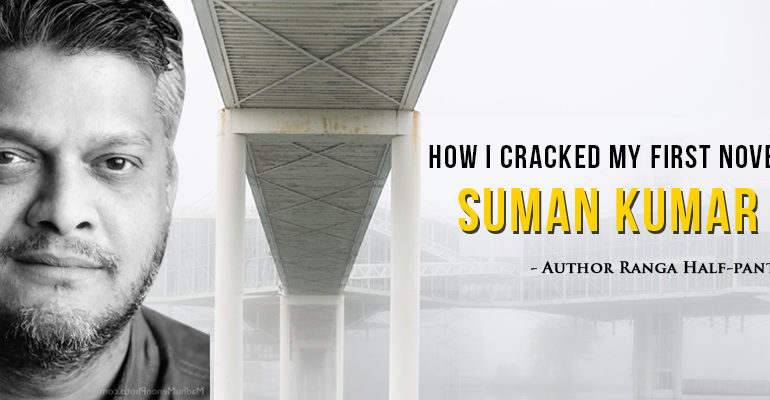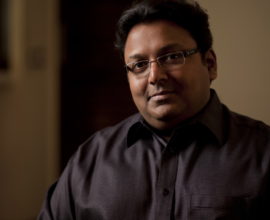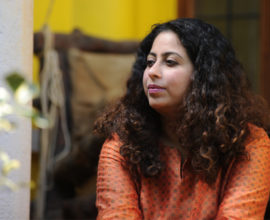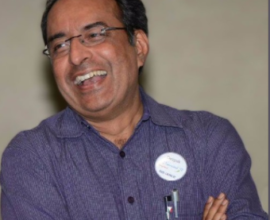Suman Kumar, Author of ‘Ranga Half Pants’, on How he Cracked His First Novel
In this episode, we speak with Suman Kumar, the author of the newly launched coming-of-age novel, Ranga Half Pants. Suman has an interesting background. After spending a decade and half in large companies like Wipro, Dell and ESPNCricinfo, he took a very off-beat decision to quit a life of computers to follow his passion with words. He is now a movie script writer, a stand-up comic and an author.
This podcast is supported by NotionPress, India’s largest publishing platform. Their goal aligns perfectly with that of this podcast which is to help you become a published author. Here is a great podcast for writers to begin their publishing journey.
Let’s jump in to hear what advice Suman Kumar has on authoring your first book.
[Music]
Hello and welcome to the first book podcast. A show specially for those who have dreams and aspirations to become an author. My name is Kiruba Shankar and every week I speak with experienced and bestselling authors to understand their writing habits, best practices, and tips to successfully author a book. This podcast is supported by Notion PRess, India’s largest publishing platform. Their goal aligns perfectly with that of this podcast, which is to help you become a published author. In this episode, we speak with Suman Kumar, the author of the newly launched coming-of-age novel Ranga Half Pants. Suman has an interesting background. After spending a decade and a half large companies like Wipro, Dell, ESPN Crickinfo. He took a very offbeat decision to quit a life of computers to follow his passion with words. He’s now a movie script writer, a standup comic and an author. Let’s jump in to hear what advice Suman Kumar has on authoring your first book.
Kiruba: Hey, Suman! Welcome to the show.
Suman: Hey, thanks, Kiruba for having me.
Kiruba: Super congrats on the launch of your new book.
Suman: Hey, thank you so much man!
Kiruba: Give us a twitter version intro to your book, Ranga Half pants.
Suman: It is the story of a fourteen-year-old Ranga, set in 1986 in a small town in Andhra Pradesh. The story is about when Ranga goes to school and he discovers that he is the only boy who’s still wearing half pants. So, the journey from half pants to full pants is the story.
Kiruba: Superb! So, you know that this podcast is targeted towards first time authors and you are one. And you have successfully finished the entire journey. So, I’m going to start from the very basic; for how long did you have this dream or the wish to author a book?
Suman: 6 or 7th standard. When I was 12 years old, I’ve always wanted to tell stories. When I was in my 8th standard, I used to write on those long hands on those 192-page unruled notebooks. So, I used to write stories on them. For as long as I can remember, I loved telling stories.
Kiruba: So, we are in our early forties. So, it took us this long, right? For you, as a 12-year-old kid, you had this dream and it took you this long for you to realize that. What is it that was hindering you? Why didnt you do this earlier and why did it take this long?
Suman: I didn’t know what I don’t want. So, I ended up doing a lot of things I didn’t want to do. When I say I didn’t want to do, I did it for money and I realized later in life that that was not what I actually wanted to do. So, you know how it is like you know when you’re from a lower middle class family, your parents want you to be an engineer or a doctor, especially in 90s and late 80s, that was the thing. Nobody even thought about the fact that you know there is this kid who’s writing novellas in unruled notebooks. Even I didn’t know because you know there was nobody to guide me. I think I didn’t have a guide; I didn’t have enough guidance. You know what you need to do, you need to join a writing school or you know study literature or something like that. I did not have that guidance.
Kiruba: And for the audience I am going to reiterate what I told you in the introduction that Suman was actually an IT guy for almost all his life. He worked at Wipro, Dell, and later at ESPN Crickinfo. He quit all that and done the unthinkable. Now he is a stay-at-home dad and he is proud to call him that. He is a movie writer and a standup comic as well. That’s awesome. So, Suman, tell us about when did you get started off with this dream because people listening to this podcast are exactly in the same position that you were a year or a year and a half ago. How did you begin turning this idea into the title into the book and what was the process.
Suman: This is slightly longer. So, one is when you get an idea for a story, I’m talking about fiction. I really don’t know how non-fiction works. I still think it is story-telling. But I will talk about fiction. When you talk about fiction, when you get an idea itself, oh my god, this is such a great story, it has so much potential; when you realise that, it is almost like having a baby. Keep blogging for a long time, man. I’ve been blogging since 2002. I want to write on my blog pos; even on my blog I write about, write stories about my small town, how life was in my small town. When I was writing a blog post about how you had to go to tailors to have your outfits stitched for your birthday or for Diwali, that’s when this idea came and I just shelved the blog post plan and said I’m going to write a book on this. Easily 3 years ago, 3 or 4, probably more. This is what my book is going to be about and I locked in and locked the idea. After that, I did a lot of research and not like I needed to do a lot of research. For example, the story is set in 1986, so I had to study everything that happened in 1986. Not just in this small town in Andhra Pradesh, which is Chitoor, but also about all across India like in 1986, the infamous match where Miandad hit Chetan Sharma. Thought it doesn’t find mention in my book, I discovered all of this; kind of fell in place and being a movie writer helped. Before I wrote this book, I had already written the screenplay for Rajan DK. The directors of Go, Goa, Gone and Shor in the City. I already had written a screenplay for them. A screenplay involves mostly structure and how you structure a story, how you will design and develop your characters with minimal effort. That kind of helped.
Kiruba: I know you’ve been blogging for many years. So, did that help in you becoming a writer, or becoming an author now?
Suman: Absolutely, yes! In fact, I would have brought this point if you hadn’t asked this question. The thing is I didn’t go to any writing school; I don’t know any formal in writing, so to speak. Plus, my English skills are self-taught mostly because for a long time, I used to write like how The Hindu articles would read because that’s the paper I used to read. But still I am not as good as when I want to be when it comes to English skills; the language skills. My toolbox is not as sophisticated as it.
Kiruba: This is a very important lesson for all the listeners that you dont have to have the perfect Oxfordian English to become an author. So, you are cool at what you are and what you need to do is translate your ideas.
Suman: But it doesn’t mean that you can go and write in SMS language. It’s like you can’t make a grammatical mistake even in your mother tongue. You can’t write something that is syntax is not wrong. That goes for English as well. But I know what people say is communication is important; it’s about the story, it’s not about…as long as the audience understands, it doesn’t matter. It doesn’t matter, but you know what, it does matter because developing a software product, the idea is great, the blueprint is great and everything is great and you know what I’m going to have bulbs. Will you do that? No, he won’t. Yeah, what I would suggest is that don’t do what I did. Don’t learn by making mistakes. To answer the question about blog post, that is exactly why I started blogging. If you take a blog post, I started blogging, after you started, when I saw you blogging. If you look at the blog posts I wrote in 2002, the stories that I started writing a few years later, look at 2010 or 2012, you see difference in the language, and structure. Everything is like, you know, improved. But for me, the thing is we don’t have to spend 10 years to do this. All you have to do is go join a writing school, study literature and you’re sorted. And for example, my wife gifted me an illustrated Renin Martin and I unlearned all that English grammar and I started learning the basics. I used word power made easy to see how I can increase my vocabulary. So, all these are tools as such. You have a budget tool box, you can execute a job. You cannot go to a war with a latti in your hand. That’s the whole point.
Kiruba: Got it! And what is your writing schedule like? You can talk to us right from the time you started working seriously on the book. So, what’s your daily schedule? Give us an insight.
Suman: So, every day I used to sit for at least one hour. That’s the minimum that I used to do. 90 minutes, I will sit in front of my computer. Whether I am writing or not, meeting the word count or not, one and a half hours is pure writing time. I used to sit in front of my computer and I used to do it.
Kiruba: And which time was comfortable?
Suman:That time I was in Kolkata, my daughter was in playschool. I used to drop her at the playschool. Once I come back home, the windows that I have, between her school hours, that’s when I used to write. Because once you have a baby in the house, you cannot do anything in your house.
Kiruba: Right, very true! And all parents will understand. I know this is your first serious attempt at writing a book. Well, you’ve been a writer and you’ve done movie scripts and blog posts and all. But as a book author, this is your first attempt. Are there any mistakes that you did that you will not repeat while you’re writing your second book?
Suman: Yes. Though I did not have a self-appointed schedule. Most often, I never used to stick to it dilgently. So, my discipline is something you need to have. Not just writing or anything, it is that disciple that makes you a better artist, a better writer, better comedian or whatever. And I still lack discipline. I keep telling myself, you need to be more disciplined. It’s like playing the guitar. It’s like how do you develop memory by doing it repeatedly. If you are not going to sit every day and write, at that particular point that you set for yourself, you are not going to be a writer. Like, right now, I want to be a better writer right now, than I am today because I haven’t been putting in the….I don’t think I will repeat the mistake on discipline. The number two is tool box. You need to have a toolbox.
Kiruba: So, explain what do you mean by toolbox?
Suman: So, this is what Stephen King calls. A toolbox is nothing but your grammar, your composition, your English skills, how culturally aware you are. For example, I can go and use the word like rowdy. I use a lot of vernacular phrases in my book, in both Tamil and Telugu. All of these, this knowledge of culture, this understanding of syntax, which is grammar and the structure of it like how do you design a dialogue between characters, how you design characters, what is this arc of the story, what is the arc of the character. All these things are avilable on the internet. All you need to do is read it. In fact, there are cheat-sheets that will guide you for 21 chapters. So, they exactly tell you what you need to do in chapter one to how you end it in chapter 21.
Kiruba: Right. So, if you can mail me your favorite cheat-sheets, then I can add the links added on the show.
Suman: Absolutely, I will mail them to you.
Kiruba: Perfect.
Suman: I didn’t have a great toolbox, so when I started, I realised that there are times when you are typing and you suddenly realised that you know what you have written is pretty ordinary. And you are writing it because you know most of them forget that it’s a journey. That’s also a journey as well. You’re trying to say, oh my god, I have to clock this 60000 or 70000 words, I have to be done with it and publish. Get published and get the book out and become famous, get royalty and become rich. We kind of get lost in that game and my advice is all of that is not in your hands and what you really can control is your writing. Ironically, it is in your hands.
Kiruba: Right! And the fact that you should enjoy your writing as well.
Suman: See, whether you are writing non-fiction or fiction. For example, I know you’ve written non-fiction books, you have collaborated with authors. If you don’t enjoy the process, if you are doing it because it’s a cool thing to do, then don’t do it. Get pregnant with an idea and you are not going to rest until you deliver that baby. I am like that. I have some 10 15 stories at any given point in time, waiting to just come out.
Kiruba: So, explain how do you handle situations when you have multiple ideas and with every single idea you think that’s cool, but you have a bank of ideas that you already have? So, how do you manage that?
Suman: I am not that romantic in the sense that I also look at the market. If you look at the market, most of the books are about, I don’t want to take names, mythology, it works for Amish.
Kiruba:Now, what I meant was what do you do with, you obviously take one idea…which is…
Suman: Yeah, that’s what I am getting to it..
Kiruba: But you have various other ideas. What do you do with them?
Suman: I will get to that. So, I did have many ideas when I sit down saying I am going to write a book. This is why I gave up my day job and I wanted to do it 100%, writing part. One of the first things was I looked at the market to see where the gap was. That was the first thing I did. The gap was that everybody was talking about most of the popular books were about getting a girlfriend and that captured the market with time. I am not passing any judgement, you know, those work and those mythology, Amish did a great job with his Shiva trilogy. It captured the imagination of millions of young people. I saw that ok, I cannot do this. There is a gap, a small town which is the heart of India. This heart and soul of India is a small town, you know that’s where the true India still lives; in the villages and small towns. I realised that it’s been a long while since a book has come out which kind of painted this beautiful picture of a small town. I am just saying. When I did that, then like, and I already had this idea and I coupled it and I just thought Ok, this is what I am going to go for as my first book. It kind of worked out also for me. It is not like a spontaneous decision, oh my god, this is a brilliant idea and I am going to write this. I have equally good ideas; ideas that are closer to me. But I went with Ranga Half Pants because I knew that it has a space and it can fill a void that exists as we speak. My long story short, you not only look at the merit of the idea or the story or what you want to, paint through your words. But you also look at the market and say, especially, you need to be savvy like that. You need to see there is a gap if some publisher or literary agent looks at this idea and says, “oh my god yes, I think it is a good idea and I think you should do this.” Because most often and not it is about that. Publishers think like that. They don’t think about…you know, I cannot write another Shiva trilogy. It doesn’t make any sense. That’s my point.
Kiruba: The writing is well within your hands, within your control. But once the book comes out and you put it on Amazon or Flipkart, it is open for people to read and review. There is no guarantee that everybody will like. So, I’ve realised that many people kind of shy away from writing a book because they are afraid of being critiqued. What if my book is pathetic? What if others laugh at me? What advice will you give for first time authors?
Suman: If you thought that is very scary, you should try standup comedy. That’s a great question because I finished my first draft and it took me one year, after I finished my first draft, to think about even pitching it to someone. That’s how petrified, I still am, about what if somebody discovers that or looks at me like are you even a writer. You know what, I will never repeat my mistakes. But will I stop making mistakes? No, I will continue to make mistakes and I think that is how you evolve. And there will always be, see at the end of the day, any person who has paid money to buy your book has the right to criticize you and that is perfectly fine. And for every person that criticizes you there will always be people who will come and praise you. So, there is no ignominy and somebody criticising your work of art. It is perfectly fine and I don’t think you should take…that is why I think you should be married to write. Anyways, after marriage you lose all sane, so[laughs].
Kiruba: That is going to resonate very well. So, Suman, how did you crack the publisher part? Usually, that is something that lot of people lack.
Suman: Yeah, I think in India it is a very nascent or an infant market because most people dont know what to do. Aspiring writers, this is what I tell you – get yourself an agent; you need a literary agent because publishers get hundreds of manuscripts in mail every day and they don’t know you are special yet. So, get yourself a literary agent. Lots of them out there are willing to help first time writers. Then, Google for Kanishka Gupta, he is my agent and he is extraordinarily supportive not just with aspiring writers but also with established writers. He is very open minded and he gives great advice and even starts representing you with publishers. He gives great advice because he himself is a writer and he has novels shortlisted for various awards. I forgot his websites but Kanishka Gupta, I will send you the link to his website as well.
Kiruba: And I will add it. So, does having a very good social media standing, meeting a number of facebook fans, twitter followers, does that positively impact you when you go on to approach publishers?
Suman: No, they do not really…not when you are starting up…it doesn’t really. Because it works the other way. I know some twitter celebrities who were approached by publishers like whenever you want to write a book, let us know. That is when they have already become celebrities on Twitter or facebook. But most of them are not. So, not everybody is Kiruba Shankar, so, I am just saying…I am assuming that you are a listeners, people who are listening to this podcast right now, they do not have a social media asset. They probably have a decent following and all that, but that does not matter. When you are putting your book out for proposal with your literary agent, that is fine. But when you need to pull out your marketing ammo is when your book is about to get released, about to be launched. For example, I have a facebook page, I built it. I have a website for the book. I am giving free chapters at sumankumar.com for Ranga Half Pants and I spoke to you, I called you, give me advice. I speak to a lot of my friends to promote it on Twitter. You may not be a social media celebrity but I am sure you have that one person who has this social media celebrity in his or her own right. So, I am pulling out all stops, I made, I’ll give you an example…I had this idea that I need to do a promo for the book, other than this usual website and facebook page and all that. I wanted to do something extra. So, I did, I approached Krish Ashok and both of us, I wrote the lyrics and both of us came up with a song called Ranga Half Pants. It will be out soon, there is a teaser for it.
Kiruba: So, for those of you listeners who don’t know who Krish Ashok is and he is an amazing guy. He is actually the head of the social act at TCS and also a brilliant creative mind.
Suman: Ashok and I did this song together, which is still at the final stages of getting the final mix. So, the song came out of it and Ranga Half Pants and the idea is and I told my publisher that this is what I did…Now can you help me..or can you ask your team to do some sketches, so we can release the trailer with the song as the background? A 30-second trailer or a 6-second trailer that encapsulates and elucidates what exactly Ranga Half Pants is about and makes it alluring, makes it enticing. So, I think even your publisher will be really thrilled. You are not just saying, I have written a book, I have a contract and I am done with it. No! It is your baby and most of us do not have the luxury of marketing budgets. So, you will have to pull out all stops to make sure that your book is heard. For example, I was in Mumbai, I was performing with Varun Grover, who is a standup comedian and a screenwriter. So, Varun looked at my, I had the proof copy, the uncorrected proof copy…No, this is your book? He said, “I have seen it somewhere.” I mean that is the power of putting out there and making a little bit of a noise with the help of friends because Varun does not even follow me on Twitter and he looked at this and said, “I know this looks very familiar.” And that’s the first step. If you generate this kind of curiosity, your book will always sell.
Kiruba: One final question! So, what is your future plan? Any books lined up?
Suman: I have started writing my second book, like a…you know this…I just finished researching on this topic and now I know the story. I am like three chapters down in my second book because I am not going to rest on Ranga though I have to push Ranga as Ranga Half Pants is out. Yeah, I just love this whole thing. I tell myself, before I turn 50, I should at least write 10 books.
Kiruba: Oh, that’s a great call. That’s a great call. So, on that positive note, Suman, I want to thank you so much. It’s a great load of insights on books for a lot of us who are trying to write our book. So, thank you so much and good luck with your second book.
Suman: Thank you so much, Kiruba for having me on your show and yeah, folks please, sumankumar.com to get the door open for Ranga Half Pants. Thanks once again, Kiruba for having me in this show.
Kiruba: You were listening to the first book podcast, which is India’s first podcast specially aimed at first time authors. Do tune in every week to notionpress.com/podcast to follow new conversations with bestselling authors to hear their tips and tricks and techniques to help you become a published author. On that note, a word of appreciation to Notion Press for supporting this show. I would love to hear your feedback and encourage you to write to me at kiruba@kiruba.com. Take care and bye.
[Music]





